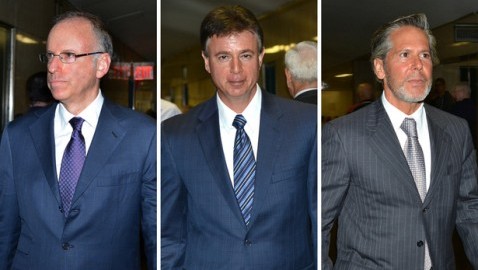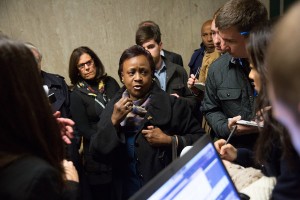Summary: The high profile fraud and larceny case against Dewey & LeBeouf’s three former executives was declared a mistrial on Monday.

Steven Davis, Joel Sanders and Stephen DiCarmine of Dewey & LeBeouf. Photo courtesy of American Lawyer.
BigLaw wins again. The fraud and larceny case against three executives of the shuttered law firm Dewey & LeBeouf was declared a mistrial on Monday by Acting Manhattan Supreme Court Justice Robert Stolz.
After four months of trial and over three weeks of jury deliberation, a New York Supreme Court jury was deadlocked on 93 charges against defendants Steven H. Davis, Stephen DiCarmine and Joel Sanders. The three could be tried again on the deadlocked charges.
The jury consisted of seven women and five men. They had previously acquitted the three on dozens of charges but were deadlocked on the remaining 93. According to JDJournal, these charges included grand larceny and scheme to defraud.
To recap, chairman Davis, executive director DiCarmine, and CFO Sanders were accused of scheming to manipulate financial records to defraud bank lenders and insurance companies during the financial crisis before the international law firm collapsed in 2012. During the trial, witnesses shared stories about Dewey & Lebeouf’s wild parties and the inappropriate behavior of its unscrupulous partners. Incredulous numbers such as $250 million in taxable income and $295 million in partner payouts were also thrown around.
According to the New York Times, some of the jurors interviewed after the trial said they were confused by the 151 charges. The newspaper implied that how the evidence and information was presented to the jurors was to blame for the trial’s outcome, noting in a technical case such as this, a challenge is to take numerous business documents and translate them to laymen’s terms in order to not overwhelm the jury.
American Lawyer published similar statements from the jury. Juror Shenequa Hopkins said, “It was complicated.” Juror Rochelle McGowan said the case was “too technical.”
While some of the jurors interviewed by American Lawyer expressed that they thought the three were guilty, Juror Edith Hines, a retired state worker, wanted to acquit Davis. After the trial, she hugged him and said, “everything was not guilty from our side.”

Juror Edith Hines (pictured center) gave defendant Davis a hug after the trial. Photo courtesy of New York Times.
The mistrial ruling was an overall blow to the prosecutor, Cyrus R. Vance. Jr., who had previously experienced defeat in two other major white collar crimes. It is unclear whether or not he will retry the case.
So what’s next for Davis, DiCarmine, and Sanders?
The Wall Street Journal reported in January of 2014 that Davis landed a job as chief legal officer to the government of Ras al Khaimah. It is noted that the job announcement came before the case was indicted.
It is unclear what DiCarmine and Sanders are now doing professionally, but a profile in the New Yorker states DiCarmine has ties to the Bonnano Crime Family.
While some disgraced lawyers have managed to have successful careers after their scandals, others have faced obstacles because of their infamy. JDJournal recently profiled Mel Weiss of Milberg Weiss who was sentenced to 18-33 months in prison for illegal kickbacks. He was eventually disbarred and returned to school to work as a mediator and arbitrator. The octogenarian had trouble finding business, and he has sold his impressive Picasso art portfolio and put his $18.8 million Long Island property on the market.
Only time will tell what happens next with these three former executives.















































